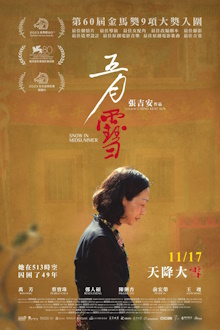My wife has been paying close attention to this latest film directed by Chong Keat Aun as it seemed impossible that it would ever be released in cinemas here in Malaysia. That’s because this is a film, supposedly the very first one, about the 13 May 1969 racial riots in Malaysia, a notoriously touchy subject in our country. Surprisingly it eventually did appear in our cinemas, possibly because the current Prime Minister is Anwar Ibrahim. However it has been significantly censored with lines muted and parts of the screen in some scenes blurred out. My wife was disappointed that it only touches on the historical events lightly, preferring to evoke an emotional reaction by focusing on a very small set of fictional characters. I thought it worked fine but it’s hard to see how non-Malaysians will be able to get much out of it.
In 1969, Ah Eng is a little girl who lives with her parents and an elder brother in Kuala Lumpur. There is palpable tension in the city following the general election on 10th May. Nevertheless her family seemingly go about their day as usual on the 13th May. Even as a theatre troupe prepares for a performance of a classic piece of Chinese opera, her father and her brother are at the temple. The boy is misbehaving and the father is begging for help from a local deity to teach him discipline. When Ah Eng and her mother arrives bringing food, the father is dismissive towards them. He refuses to let her be blessed and they are forced to go to the back of the temple to pray with the other women. Later, while Ah Eng and her mother are watching the opera performance, the father says that he taking the son to the cinema instead. When night falls, a man riding a bicycle comes up to the theatre and shouts about killings and buildings being set on fire. The crowd scatters and Ah Eng’s mother wants to go to the cinema to look for her husband and her son. But the opera troupe convinces her to hide out there until the trouble passes.
The film avoids providing any exposition about the surrounding context and there is no on-screen violence. The worst that you see are screams far in the distance and flames on the horizon. There’s a note that these characters are fictional but we’re meant to understand that they’re representative of the actual victims of the race riots. These precautions no doubt help to enable the film to get past the censors and avoid too much controversy while conveying the horror of what happened without calling unwanted attention to the families of the victims. My wife was disappointed as this means that the film sheds very little light on the historical events, not even small snippets like the number of people who were actually killed. For my part, I think it works. The intent is purely to convey the unspeakable horror of the event, emphasizing the shock and surprise that such a thing could happen in a civilized society and then simply be swept away and forgotten about. Chong’s criticism of the Malaysian government’s silence and active avoidance of the subject is implicit yet powerful. There is no memorial for the victims and the burial site for the victims is deliberately allowed to be overgrown and neglected.
As with the director’s previous film, this deliberately showcases the diversity and richness of Malaysian Chinese culture. To my wife, it’s yet another digression from the riots themselves. But to someone like me who is less familiar with it, I think it’s brilliant. It gives you some idea of who the victims were, what their lives were like in the 1960s, and from there gain a better sense of how much was lost. The attention to detail is fantastic. Their clothes, the sets, the accoutrements of their everyday lives all feel authentic, and showing them here works to inform later generations of what life used to be like. Employing the classic Chinese play about Dou E to refer to the killings is downright brilliant as in using Raja Bersiong as the film that Ah Eng’s father and brother are watching in the cinema. With a screenplay written by Tunku Abdul Rahman, Malaysia’s first and then ruling Prime Minister, it can be said to be above all criticism. Yet its story about the literal bloodthirstiness of those in power is so on point and it could also be a subtle reference to a popular theory about the true reason behind the race riots: to undermine and force the Prime Minister to step down. These no doubt carefully considered inclusions really help to immerse the viewer in that era, even as it refuses to provide much in the way of specific details on the riots themselves.
I have a few gripes here and there. The awfulness of Ah Eng’s father reminds us that they might have been imperfect people but they were still loved and missed all the same. But making her own husband such a terrible person as well feels like an unnecessary step too far. I feel that the ending has too much exposition and feels clumsy compared to the rest of the film. I also think that casting a Taiwanese actress as the adult Ah Eng feels like the wrong move as she clearly doesn’t speak like a Malaysian even when she is given the right lines of dialogue. But overall I would say that this is a success and solidly cements Chong among the great Malaysian directors to watch. It’s undeniably true that far too little attention have been directed towards this tragedy and it is great to have this added into the historical record.
